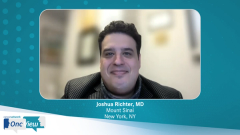
Bispecific Antibodies in the Treatment of Multiple Myeloma
An expert oncologist evaluates the effect of combination trials of bispecific antibodies on the multiple myeloma treatment landscape.
Episodes in this series

Transcript:
Joshua Richter, MD: One of the things that was very prominent at the 2022 ASH [American Society of Hematology] meeting was some updates regarding the bispecific antibodies in multiple myeloma. There are quite a number of them in clinical trials. Teclistamab is already approved based on the MajesTEC data, and elranatamab is hopefully coming to approval soon, based on the MagnetisMM data. Both drugs in single-agent studies have shown response rates of around 60% to 80%. The response rates differ based on patient population and prior exposures, but one of the things that’s extremely encouraging is even better response rates when we combine these drugs with other agents within the myeloma field. For example, the TRIMM [study] protocols are evaluating teclistamab in combination with other therapies, such as daratumumab, in patients with multiple myeloma. These are posting very high response rates, and many of these studies are also being informed by some of our prior umbrella or combination studies, such as STOMP, where we combined selinexor with drugs like daratumumab, pomalidomide, or lenalidomide.
Ultimately, what these combination studies show, both with selinexor and the bispecifics, is that as patients take their individual journey throughout myeloma, we’ll have an answer for everyone. If earlier in the course of therapy you get a drug like teclistamab plus daratumumab, and now you need a drug like selinexor, you can combine it with a drug like carfilzomib, because we have the data for that combination. Conversely, let’s say you got selinexor, Velcade [bortezomib], and dexamethasone earlier in your treatment based on the BOSTON study. You could then go on a regimen like teclistamab, daratumumab, and dexamethasone, or a combination that’s being studied, like elranatamab and pomalidomide. We have many different plays here to help negotiate everyone’s individual journey, which is giving us more options to treat heavily refractory patients.
Transcript edited for clarity.
Newsletter
Stay up to date on recent advances in the multidisciplinary approach to cancer.








































